Robert Pattinson Bel Ami
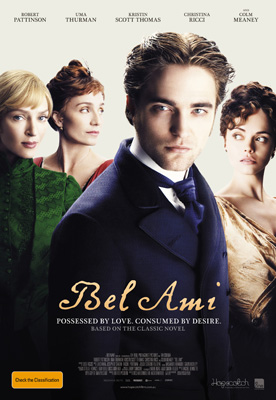
Bel Ami
Cast: Robert Pattinson, Uma Thurman, Kristin Scott Thomas, Christina Ricci, Colm Meaney, Philip Glenister, Holliday GraingerDirectors: Declan Donnellan, Nick Ormerod
Genre: Drama
Rated: MA
Running Time: 102 minutes
Synopsis: Georges is recently returned from the French army in Algeria and has come to Paris to better himself. Down to his last few francs, he bumps into Forestier, an older man whom he knew in Algeria. Forestier tells him that Paris is filled with money and opportunities; he brags that he is the Political Editor at La Vie Française, a newspaper poised to bring down the government. He invites Georges into his home for dinner.
The dinner is attended by the cream of Paris society. Forestier, his beautiful wife Madeleine and the newspaper's editor, Rousset, rail about the political situation in North Africa, where the government is planning to enter Morocco. Madeleine says that the newspaper should publish Georges's diary of a young soldier. She offers to help Georges but in fact writes the romantic account herself. She suggests that Georges should call upon two of her friends: the demure Madame Rousset and the sweetly flirtatious Clotilde. She advises him that the most important people in Paris are not the men but their wives. Madeleine sends Georges away when the elderly Comte de Vaudrec arrives for his weekly visit.
At La Vie Française, Georges finds that the diary has been a success and Rousset puts him on the payroll. Georges pays a visit to Clotilde. Her young daughter warms to Georges and calls him "Bel Ami", a name that sticks with the society ladies. Georges and Clotilde start an illicit affair but after enjoying a lot of fun together, she breaks it off.
Georges feels that his luck has run out. Forestier has run out of patience with the young man. He can't write without Madeleine's help and, even though colleagues murmur that Forestier's wife writes everything for him, Forestier fires Georges. Georges finally sees a reason to visit Madame Rousset, his former editor's wife. She is easily charmed by him and he finds himself re-employed at the newspaper as Head of Gossip.
Now back in society circles, he is reunited with Clotilde, who tells him that Forestier is dying and that Madeleine has taken him to the coast. Georges senses another opportunity and follows them. He stays by Madeleine's side until her husband is dead and buried.
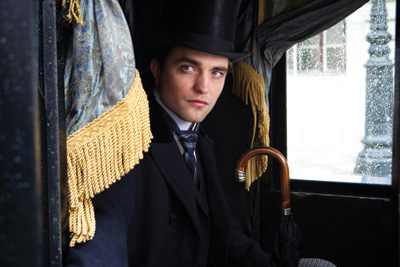 Georges marries Madeleine. Now that Madeleine is writing for him again, Georges is promoted to Political Editor. Madeleine throws herself into the work and the stories that Georges submits play a pivotal role in overthrowing the government. Rousset throws a lavish party to celebrate what he sees as his political victory. When Georges tries to claim his part in this coup, Rousset goads him - he tells Georges that Madeleine is completely under the control of the Comte de Vaudrec.
Georges marries Madeleine. Now that Madeleine is writing for him again, Georges is promoted to Political Editor. Madeleine throws herself into the work and the stories that Georges submits play a pivotal role in overthrowing the government. Rousset throws a lavish party to celebrate what he sees as his political victory. When Georges tries to claim his part in this coup, Rousset goads him - he tells Georges that Madeleine is completely under the control of the Comte de Vaudrec. Sensing that she is attracted to him, and to get back at his boss, Georges sets his sights on Madame Rousset. She is easy prey to him and he seduces her whilst she is at prayer in church. They start an affair whilst Georges simultaneously continues his love affair with Clotilde.
The Comte de Vaudrec dies and bequeaths his fortune to Madeleine. Georges's suspicions about the intimacy of their relationship are confirmed and humiliated, he turns on her. Grief stricken, Madeleine admits that the man had been everything to her: friend, father and lover.
Madame Rousset has become infatuated with Georges. Disgusted by her, Georges spurns her advances, so she tries to win him back by revealing that the new government is now going to invade Morocco. Her husband knows all about it and what's more has been exploiting the situation in order to make his fortune. Georges brutally ends their affair and angrily confronts Rousset and Madeleine, who he imagines was also involved. They both turn the tables on Georges, casting him out of their lives.
Georges turns up uninvited to Rousset's party where he is snubbed by everyone, including Madeleine. Only Clotilde is welcoming. They talk and Georges accepts that he has behaved like a fool. Back at the party, Rousset and his wife are presenting their teenage daughter, Suzanne who smiles at "Bel Ami".
Georges takes the police with him to confront Madeleine and her new lover. She willingly confesses to the crime of adultery. Now free again, Georges runs away with Suzanne. When her parents catch up with them, Rousset insists that Georges must marry Suzanne to save her character, in spite of her humiliated mother's protestations. When Clotilde finds out what he has done, she berates Georges for his cruelty. His defence is that he must do whatever it takes to fight his way out of poverty.
Georges marries Suzanne in a grand ceremony. As the couple walk down the aisle, Georges sweeps past the women he has used and abused to attain his final goal: Madame Rousset, Madeleine and Clotilde, his one true love.
Release Date: May 24th, 2012
About the Production
"It's about a very beautiful cut-throat young man who discovers he has got one commodity to sell," states one of the directing team, Declan Donnellan of Bel Ami's anti-hero Georges Duroy. Donnellan continues, "He seduces powerful women high up the tree of French society, mostly connected with the newspaper industry. He uses sex and their huge attraction for him to get to the top of the pile. It's an unremitting world and in the end he gets the lot. So there are no consequences for him."Bel Ami is based on the 1885 novel of the same name by Guy de Maupassant. Screenwriter Rachel Bennette explains how the film project first came about. "I'd worked with Uberto Pasolini, the producer, quite a long time ago. We'd kept in touch and then he came to me and said, 'What do you think about doing Bel Ami?' And I said, 'Yes please'!"
The two directors, Declan Donnellan and Nick Ormerod were involved from an early stage in the process. Bel Ami would be their feature film debut as both directors have worked in theatre for 30 years, founding the innovative company Cheek by Jowl they are now joint Artistic Directors of. Both men have always been passionate about film. Declan Donnellan explains: "We're big movie buffs. We've been dying to make a movie for ages, but it's been quite hard to find a window. We wanted to make a movie and are very grateful for the opportunity to do so."
In spite of the fact that the directors came from a different background, Rachel Bennette explains that after they had started talking, about three years before the film went into production, that the working process was very typical. She goes on, "They obviously had things that they loved in the book, and an approach that they were interested in. So it was a fairly regular development process. We'd meet sporadically - they were obviously doing their theatre stuff - and then when they had some spare time they would come to the book again, we'd have another conversation, and I'd do a draft."
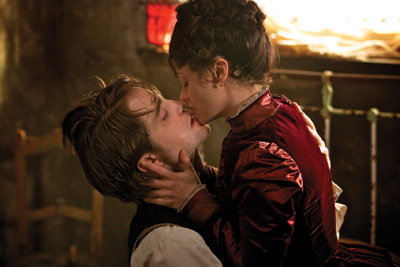 Original Novel
Original NovelOn the original novel, both directors say that they have always loved Bel Ami, and were even considering adapting it for theatre when approached by Uberto Pasolini. Declan Donnellan explains further, "I first read Bel Ami in translation when I was 18 at school. It was so shocking and it's still shocking today."
"It's an incredibly subversive story. It's Guy de Maupassant at his most savage and ironic," continues Donnellan, going on to outline how the themes still resonate today. "It's very ironic about the media. The other ironic thing about the story is that there are so many modern parallels. It's about the manipulation of the media; a government illegally invading an Arab country for their natural resources and lying to the people; how the media does or doesn't collude; sex; celebrity; and it's also about how somebody can get to the top with really very little talent."
Nick Ormerod concurs that the film's contemporary resonance should help people connect with it despite its period setting: "It's there, right in their faces. It's almost as if it happened yesterday."
"That whole world of celebrity is particularly interesting", Declan Donnellan continues. "People think it's very modern --- somebody getting to the top with very little talent. It's about exactly that. Georges has an enormous desire to get to the top, and that is his talent. It's about incredibly modern themes. That's one of the thrills of doing this story. It is set in 1890s Paris but it would almost be too near to the bone to do it now."
Rachel Bennette explains how she worked at adapting such a dark tale. "I think Maupassant is a great realist, and he's not really interested in fairytales or in moralising. I think really he just wants to put a mirror up to what was, for him, a very corrupt society that he was living in." However, she continues, "At the same time, there's a great honesty in the book about human beings and how they behave. So that, somehow, even though it's very dark, and it's really quite disturbing in bits, I think you also feel there's no hypocrisy in the writing, and there's no softening or soft---soaping of the difficulties of life."
"Maupassant actually wrote the book when he was suffering from syphilis, so he was looking death in the face at that moment - although he died I think about eight years later - but he knew what was coming", Rachel Bennette notes. "I think the book is kind of full of this, the extremes in a way, of the fear of death and the sense that life is brutal and vivid in that way. But at the same time there's this great passion for life, so that you couldn't really have one without the other. I think the darkness is essential to the life force in the book."
It is perhaps this idea of the writer facing his own mortality that connects to the story being quite steamy and sexy. Rachel Bennette continues, "What is quite interesting is, for a book which is full of sex, syphilis is not the big disease of the book; tuberculosis is the big disease of the book. But I think, essentially it's the same principle. There's never any mention - even though there are prostitutes and all of those sorts of relationships. But at the same time it's obviously really looking death in the face."
For Rachel Bennette, the challenges in adapting the book were twofold, as she explains: "There's the volume of the story, and there's the fact that the main drive of George's character is towards ambition and power and money and status, which are not in themselves emotional ideas in a way. We don't emotionally invest in somebody who wants to be rich and powerful, in the way that we would if two people are going to fall in love - obviously we immediately have an emotional connection to that as an audience. So, first of all, it's understanding that, with the character of Georges, that drive to ambition is not just a nihilistic desire to accumulate and consume, it's a bigger feeling of his appetite for life, and wanting to gobble life up before death comes for him. So it's keeping a sense of that and also locating all the elements of the story, like the ambition, the career, the rise to power, in an emotional context, so that you understand what his emotional relationship with those things is."
Rachel Bennette goes on to explain how Georges's relationship with Madeleine makes sense of the story, in a broader way. "His feelings about Madeleine, and the relationship with Madeleine, are also to do with the political story, so all of those stories are couched in a bigger emotional picture, so that you care. And the thing with pacing is that the story can gallop off, and you don't have time to really care about anyone - it's got to get from A to B. So it was a question of trying to understand when you could tell the story in quite bold strokes, with big images, or with big jumps of time, or big cuts; and when you spent more time with the characters, when you allowed them to talk to each other and for those scenes to gather their own emotional weight."
Rachel Bennette describes the way that Declan Donnellan and Nick Ormerod, given their theatre background, were especially helpful to her when she had to work on the bigger, broader aspects of the story. She explains, "They had an instinct for that bold, strong, coup de théâtre. Partly I felt like the detail is what makes the book alive, so it there was a constant question of what was too much and what was not enough detail'; how do you find the balance between when you go into the detail and when you come out into the bold stuff? While the book is written in a very specific detail, it is also very bold, so the book itself is both of those things."
Georges 'Bel Ami' DuroyThe central character of Georges was a complex and captivating subject for Rachel Bennette, as she explains. "Georges is a difficult character, that's what makes him so fascinating. He's quite enigmatic in certain respects and he's not a typical character in many ways. He's very reactive as opposed to the active protagonist that you're used to. So it was a question of trying to get the measure of him."
"He never works and he still gets it all. That's what's so maddening about Georges Duroy," Declan Donnellan concurs. "He gets the lot with no effort and it's something we have to live with. Georges has a talent to get to the top and he's a businessman with one commodity to sell. Another thrilling thing about Georges is his emptiness; people can project anything into him which is another reason why he's so successful."
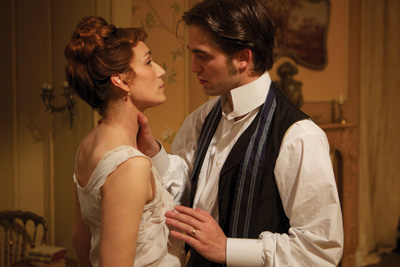 Rachel Bennette concludes: "I find Georges really compelling, even if I don't always like him. There's something about his audacity, and his daring, and his absolute refusal to be told his place. And there is something quite appealing about that: essentially it is a kind of mad courage that he has."
Rachel Bennette concludes: "I find Georges really compelling, even if I don't always like him. There's something about his audacity, and his daring, and his absolute refusal to be told his place. And there is something quite appealing about that: essentially it is a kind of mad courage that he has." Casting
"We asked actors that we really wanted to work with, people that we have admired for a long time, explains Declan Donnellan of their casting choices. "Kristin Scott Thomas we know of old. Uma Thurman, Christina Ricci and Robert Pattinson we have always admired. There's also Colm Meaney, a wonderful Irish actor who plays Rousset and Phillip Glenister. They are all actors we love."
Declan Donnellan and Nick Ormerod were thrilled to be working with such a diverse cast. Declan Donnellan describes the moment that the actors turned up for rehearsals. "It was absolutely fantastic to see them arriving one after another. They are all incredibly professional and great fun with wicked senses of humour in their own different ways; Uma Thurman, Kristin Scott Thomas and Christina Ricci are all very different people. We had a ball, an absolutely wonderful time because the material was so fantastic, the roles and screenplay are fantastic. Everybody felt like they were being stretched, especially us because it was our first movie. Kristin Scott Thomas, Christina Ricci, Uma Thurman and Robert Pattinson would all agree that they were doing things they hadn't done before, which was what made it so thrilling."
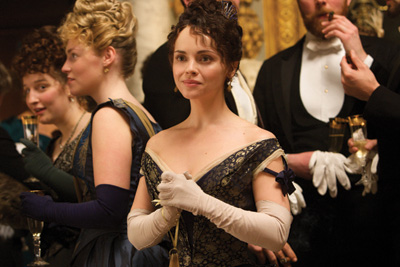 The Look and Feel
The Look and FeelCompared to their previous experience working in theatre, the two directors found it interesting to have more control over the detail involved in film. Nick Ormerod elaborates: "What is wonderful are the crafts people you work with in film and the amount of detail that goes into the recreation of a newspaper, the graphics, the tiny little props which feature. The work there is just phenomenal and the people were amazing and of course you do see right up close which is fantastic. You walk into a space; you've seen it empty; you picked the location. Then you arrive on the day and it's just completely phenomenal! The recreation of the [newspaper] office for example; it was really moving and astonishing."
Declan Donnellan further explains their reaction to the differences between the disciplines of film and theatre. "The extras, how they would be turned out, the beautiful attention to make-up... It's not us! We are just given these amazing people to work with to get over the shock of the attention to detail necessary for the set design!"
Odile Dicks-Mireaux, the costume designer talks of her experiences on Bel Ami: "It's a real joy to have been asked to do this film as it's a very beautiful period to do. We chose to do it a little bit later than the book, 1890s, and we wanted this very elegant, not too over-stylised look for our leading ladies. The principle concern for us really was the ladies. We decided that the men would stay in a sort of uniform of black and cream and neutral colours, and that the women would sort of shine through the piece. We tried to keep it very elegant. The French generally were slightly more sombre in their colourings than the British, so they would pick these puces, and greys, and greeny-greys. You know there is nothing bright or brash about the French when you look at it."
For the female characters, Odile Dicks-Mireaux and the directors came up with specific colour palettes that would reflect each of their characteristics. She explains, "Uma Thurman's was a colour scheme of greens and creams and blacks. She was to be a sort of cooler character; that was the aim. Kristin Scott Thomas's character was to start darker and slightly more sombre, and then break out into paler tones, and then go into black when she is thrown aside by Bel Ami. And then Christina Ricci's character was to sort of fit in between those two characters and be the slightly livelier character as she is the mistress."
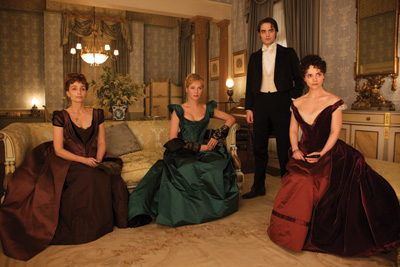 Odlie Dicks-Mireaux further explains the look that she and the directors and the producer devised, partly based around art. "We discussed that we wanted very clean lines on the evening wear, no big jewels or anything like that. Uberto Pasolini and I particularly liked the Boldini pictures I liked the John Singer Sargent pictures and you know that was how it evolved but it was a combination of a lot of different factors that then come together. I chose to have them made and cut by Daniele Boutard who knows this period extremely well and who comes with couture training so our aim was to be elegant at all times."
Odlie Dicks-Mireaux further explains the look that she and the directors and the producer devised, partly based around art. "We discussed that we wanted very clean lines on the evening wear, no big jewels or anything like that. Uberto Pasolini and I particularly liked the Boldini pictures I liked the John Singer Sargent pictures and you know that was how it evolved but it was a combination of a lot of different factors that then come together. I chose to have them made and cut by Daniele Boutard who knows this period extremely well and who comes with couture training so our aim was to be elegant at all times." Odile Dicks-Mireaux explains how the costumes she designed for Georges help to tell the story of his progression throughout the film. "He wears black virtually all the way. Maupassant writes very clearly about starching, and we spend a lot of time and effort on the shirts. This period is a very transitional period between the boiled shirt and the pleated shirt so we've done a combination of the two. We've engineered this ingenious way of making sure we can always have the stiff cuffs. I've gone for very high collars on Robert because he suits them really well and it makes them all stand up correctly. If you look at the British royal family they seem to wear a slightly broader look. You look at the French drawings and they seem to have a much tighter, narrower look --- a bit like Christian Dior suits: that very pinched, nice, narrow, elegant, long lined leg. He had a journey and then right at the end of the journey he sort of dips and goes a little bit more bourgeois and slightly pompous. He thought he might have a moustache at the end."
MORE
- Mission: Impossible Fallout
- Glenn Close The Wife
- Allison Chhorn Stanley's Mouth Interview
- Benicio Del Toro Sicario: Day of the Soldado
- Dame Judi Dench Tea With The Dames
- Sandra Bullock Ocean's 8
- Chris Pratt Jurassic World: Fallen Kingdom
- Claudia Sangiorgi Dalimore and Michelle Grace...
- Rachel McAdams Disobedience Interview
- Sebastián Lelio and Alessandro Nivola...
- Perri Cummings Trench Interview



